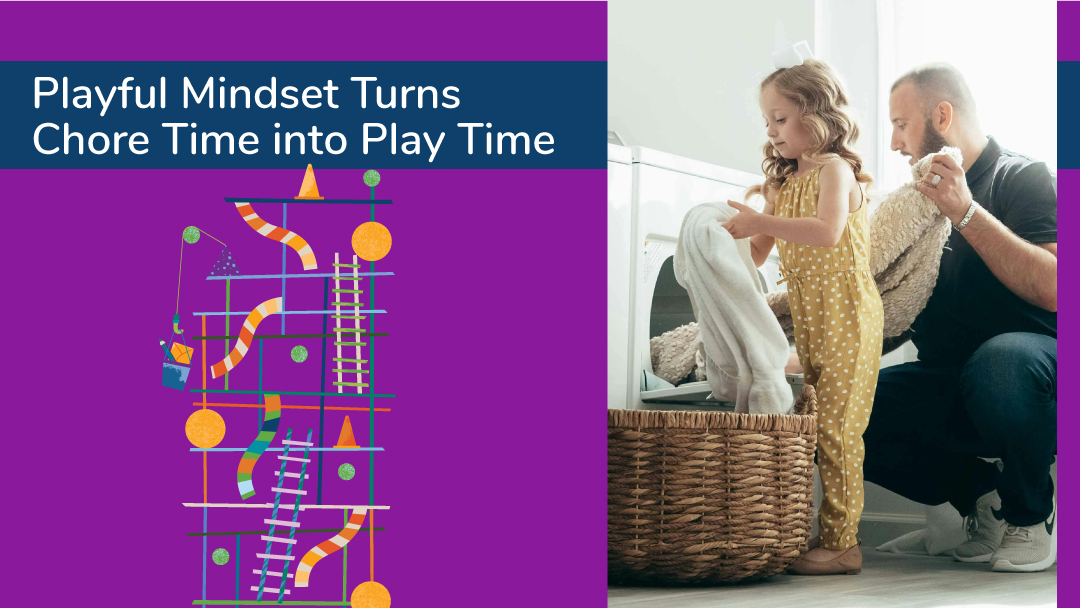
Playful Mindset Turns Chore Time into Play Time
There’s no way around it: There are always chores to do and errands to run.
Those responsibilities don’t have to be a drag on an otherwise lovely day. What if, instead, they became a way to engage with kids and have some playful time together?
Here are a few ideas to help turn the dreaded chore time into playtime.
Turn Chores into Playful Practice
Play is something kids (and adults) do because they want to. What if we spun our perception of chores around and started treating them more like play — rather than focusing on the tasks we must do, think of ways to turn each into a fun game or challenge. For example:
- Sweeping – Giving kids a small broom and dustpan provides an opportunity for imaginative role playing. Maybe they are a shop owner cleaning up after a long day at work. Or maybe a giant dust storm just rolled through their home on Mars and they need to sweep it out.
- Washing – A bucket of soapy water and a sponge becomes a car wash for play cards or a spa for action figures that need some cleaning.
- Laundry – Let kids sort clean laundry into piles based on color, owner or even size. A pile of freshly washed socks is a great opportunity for kids to play a matching game. And once the laundry is all folded, make a game out of who can put their clothes away the quickest, slowest, quietest, etc.
Turn Errands into Playful Learning Opportunities
Running errands isn’t always the most fun thing, especially for a kid who would rather be running around, jumping and playing. But with some new strategies, those pesky errands become a great opportunity to learn, imagine and connect.
- Alphabet games – Most stores are filled with countless signs and labels. Ask kids to find each letter of the alphabet, in order, while walking up and down the aisles. For beginning readers, practice reading words that start with every letter of the alphabet.
- Math games – Practice addition and subtraction by figuring out the total of or difference between two items in your cart. Or, give kids a targeted amount and ask them to find two or three things that add up to that number.
- Scavenger hunt – If errands take you something where kids need to sit still, like a laundromat or sibling’s sports practice, write out a list of items for kids to find and check off on a notebook.
- Get moving – Sometimes kids just need to move around and get those wiggles out. See how long they can march in a straight line or find out who can do the silliest walk into the store. Challenge them to hop on one foot or pretend to dribble a basketball while waiting in the checkout line.
- Color matching – Find something in your wallet or purse that is a bright color and have kids point out objects around them that are the same color. Or, for something more involved, play a game of “I Spy” where kids have to guess the item you think of based on its color.
There are many ways to make household chore and errands a more enjoyable part of your day. And as you shift your own mindset, you may find that your kids’ attitudes about these tasks will begin to reflect yours.

SUPPORTING A CHILD’S PLAY
SUPPORTING A CHILD’S PLAY
Tips for Tackling the Boredom Blahs
Kids are hard-wired to play. But even for children, the free and imaginative play that research shows is best for their development doesn’t always come easily. Sometimes their energy levels are low, daily frustrations are too high or they just can’t seem to find the inspiration to create their own fun. That’s when the dreaded “I’m bored” comes out.
Three Tips to Get the Most Out of Screen Time for Kids
Study after study shows that engaging with technology alongside your child helps them get the most out of it.
Helping Kids Manage Stress
While we can’t keep kids from feeling stressed, we can play a crucial role in helping kids feel safe and secure during stressful times.
Tips for Supporting Social-Emotional Learning in Kids
Tips for Supporting Social-Emotional Learning in Kids The pandemic undeniably affected many kids’ social-emotional development. Some studies show that younger kids are often behind in developing the skills to identify and manage big emotions – critical skills for...
Benefits of Mud Play
Playing with Mud: Why It's Worth the MessMud is messy. It’s sloppy and squishy and dirty. But it’s also a great tool for discovery and growth through play. From supporting cognitive development to boosting creative thinking and self-confidence, it turns out that mud...
Three Tips to Help Kids Recognize and Process Emotions
Three Tips to Help Kids Recognize and Process EmotionsAs parents and caregivers, part of our job is to pay close attention to kids’ emotions and help them recognize, identify and process the incredible range of human feelings. It’s not always easy! In fact, it’s often...
Play Boosts Emotional and Mental Health in Kids
Play Boosts Emotional and Mental Health in KidsIt’s no secret that the amount of time kids spend playing has been declining. In fact, kids growing up today play an average of eight hours less per week than children did in the 1980s. The trend has prompted warnings...
Getting Past “Yes/No” Answers: The Power of Open-Ended Questions
The Power of Open-Ended Questions You probably ask your child lots of questions every day. But did you know that how you ask your child questions has a big impact? It’s true! By asking open-ended instead of closed-ended questions, you help boost critical and creative...